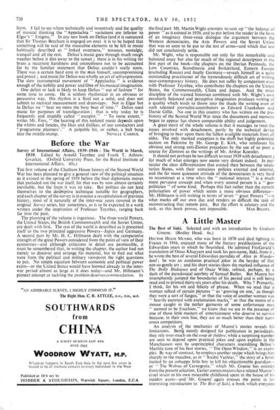Before the War
Survey of International Affairs, 1939-1946: The World in March, 1939. Edited by Arnold Toynbee and Frank T. Ashton- Gwatkin. (Oxford University Press, for the Royal Institute of International Affairs. 45s.)
THE first volume of the Chatham House history of the Second World War has been planned to give a general view of the political situation as it existed in the spring of 1939 before the final diplomatic moves that preluded not the war itself, for that was.by now almost certainly inevitable, but the fokm it was to take. But politics do not lend themselves to the dest14ptive technique suitable for geographers, and each chapter of the survey is in essence a recapitulation of previous history, most of it naturally of the inter-war years covered in the original Survey series, but sometimes, as is to be expected in a work written under the inspiration of Professor Toynbee, ranging back far into the past.
The planning of the volume is ingenious. The three world Powers, the United States, the British Commonwealth and the Soviet Union, are dealt with first. The rest of the world is described as it presented itself to the two principal aggressive Powers—Japan and Germany. A second part by Mr. H. C. Hillmann deals with the comparative strength of the great Powers considered from the point of view of their economies—and although criticisms in detail are permissible, it must be remembered that, in writing the chapter, the author, had not merely to discover and arrange his material, but to find out what were from the political and military viewpoint the right questions, to put. No simple equation between economic and political power exists—or the United States would have loomed already in the inter- war period almost as large as it does today—and Mr. Hillmann's pioneer attempt at tackling the problem deserves commendation. In
the final part Mr. Martin Wight attempts to sum up "the balance of power " as it.existed in 1939, and to put before the reader in the form of an imaginary three-voice dialogue the argument between the Western democracies, the Axis Powers and the Soviet Union that was so soon to be put to the test of arms—and which that test did not conclusively settle.
Mr. Wight, who is responsible not only for this remarkable and balanced essay but also for much of the regional description in the first part of the book—the chapters on the Iberian Peninsula, the Low Countries, Scandinavia and Switzerland, Eastern Europe (excluding Russia) and finally Germany—reveals himself as a quite outstanding practitioner of the tremendously difficult art of writing near-contemporary history. He does not suffer by comparison even with Professor Toynbee, who contributes the chapters on the United States, the Commonwealth, China and Japan. And the strict discipline of the trained historian combined with Mr. Wight's own peculiarly balanced and perceptive imagination produces writing of a quality which tends to throw into the shade the writing even of such talented journalist-contributors as Edward Crankshaw and Darsie Gillie. No one in this country who has written on the pre- history of the Second World War since the documents and memoirs began to appear has shown comparable ability and judgement.
A great merit of the whole volume is that it manages to treat the issues involved with detachment, partly by the technical device of bringing to bear upon them the fullest available materials from all sides. The only marked exception is the short but highly polemical section on Palestine by Mr. George E. Kirk, who reinforces his obvious and strong anti-Zionist prejudices by the use of so poor a source for Zionism as the writings of Mr. Arthur Koestler.
It should not perhaps be too difficult to treat 1939 with detachment ; for much of what emerges now seems very distant indeed. In par- ticular the clear differentiation that existed then between the totali- tarian States, with their conscious policies external and internal, and the far more quiescent attitude of the democracies is very hard to reconstruct at a time when the " national interest " is a much more pervasive concept and when every second person is a 't geo- politician " of some kind. Perhaps this fact rather than the current polarisation of power which seems a more obvious difference— Mr. Hillmann is still writing in terms of seven " great Powers "—is what marks off our own day and renders so difficult the task of reconstructing that remote past. But the effort is salutary and the
task, as this book proves, not impossible. MAX BELOFF.










































 Previous page
Previous page